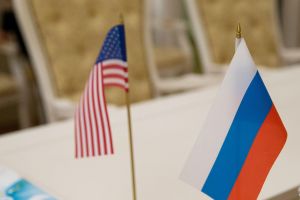Recent surveys conducted by the Chicago Council on Global Affairs and the Levada Analytical Center reveal that large majorities of both Russians and Americans now view their countries as rivals.
Summary
The last few years have seen a substantial deterioration in relations between the United States and Russia. The international crisis over Ukraine, Russia’s interference in the 2016 US presidential election, and US sanctions against Russia have all contributed to the growing acrimony. Recent surveys conducted by the Chicago Council on Global Affairs and the Levada Analytical Center reveal that large majorities of both Russians and Americans now view their countries as rivals. But in the midst of heightened tensions between Moscow and Washington, how do regular citizens of each country view one another?
A joint project conducted by the Chicago Council on Global Affairs, the Levada Analytical Center, and The Fletcher School of Law and Diplomacy at Tufts University shows that despite the perception of rivalry between their countries, Russians’ and Americans’ views on the people of the other country are more favorable. However, the survey results also show that Russians and Americans are not particularly curious about each other, they rarely follow news about one another, and the majority of each group has never met someone from the other. Nonetheless, self-reported interests from each side in arts and sciences suggest that there are non-political paths toward warmer relations.
Key Findings
- 68 percent of Americans view Russians either very or fairly positively, while 48 percent of Russians have those views of Americans.
- Majorities of Russians (80%) and Americans (61%) have never knowingly interacted with a person from the other country.
- Each public is disengaged from the news about the other country, with 44 percent of Americans and 47 percent of Russians following the other country’s news occasionally while 35 percent of Americans and 26 percent of Russians never follow the news.
- Most Americans (61%) and Russians (70%) responded that they are not very or not at all interested in the other country.
Methodology
The analysis in this report is based on data from a joint survey on Russian and American Attitudes conducted by the Chicago Council on Global Affairs and the Levada Analytical Center in February 2019.
The US survey was conducted by Ipsos Public Affairs using their national online omnibus service, KnowledgePanel™, between February 15-19, 2019 among a weighted national sample of approximately 1,121 American adults, 18 years of age or older, living in all 50 US states and the District of Columbia. The margin of error is ±3 percentage points.
The Russia survey was conducted between February 15-20, 2019 by the Levada-Center among a representative sample of 1,613 persons aged 18 years and older, living in eight federal districts of the Russian Federation. Inside each district, the sample is distributed among five strata of settlements proportionally to the population living in them, 18 years of age or older. The margin of error is ±3.4 percentage points.




